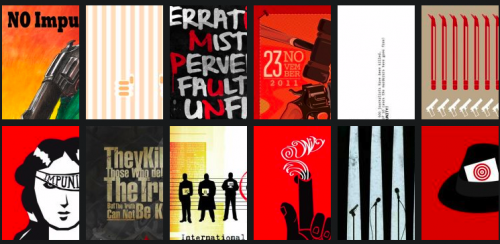Why is it Important to Fight against Impunity in Ethiopia, Zimbabwe and Kenya?
by Joshua Barnes / November 22, 2011 / No comments
Today IFEX inaugurates the International Day to End Impunity. The purpose of the day, also promoted in Facebook, is to raise public awareness of impunity and showcase the important work organizations have been doing to fight for justice and freedom of expression worldwide.
In our pages Sampsonia Way has covered many countries where freedom of speech has been attacked, in many cases without legal punishment. Because we understand that impunity is an obstacle for freedom of speech and democracy everywhere, Sampsonia Way contacted writers who have worked with us to write about the importance of fighting impunity in their home countries. Today we reproduce their comments on Africa.
Writers from Zimbabwe and Kenya, and a journalist from Ethiopia (all of whom are now living in exile), explain the dramatic impact impunity has had on their countries. For Philo Ikonya, for example, impunity has built a culture without freedom or basic human rights; a culture where the political elite habitually exploit the poor and the basis of democracy was chewed up and spit out a long time ago.
Mesfin Negash. Ethiopia. Journalist, Addis Neger.
Impunity became a rule in Ethiopia for those with the power to abuse. The first causality of this rampant impunity is freedom of speech. The people in power are using government institutions and laws to muzzle dissenting and critical voices. The international fight against terrorism, as it did in many countries, allows authorities to suppress opposition politicians, activists, and journalists. Ethiopia already charged 11 journalists, including myself, two of them Swedish, for terrorism and related crimes. Despite the fact that no evidence is presented to convince the public that these journalists are actually engaged in a “terrorist” activity, the authorities continue charging and intimidating journalists and writers. Ethiopia became the number one country to force journalists into exile in the last 10 years, and the second “leading jailer” in Africa according to Committee to Protect Journalists. Neither an official nor a government organ is investigated, let alone held responsible, for this continuous systematic attack on freedom of speech and journalists. Those perpetrating this crime in the name of “anti-terrorism,” “national-interest” and “party interest” are rewarded by the regime, and not held responsible.
Freedom of speech and those who dare to exercise it in any manner that displeases the ruling elite will be the victims as long as impunity remains the rule, an unchallenged condition the press has suffered from for 20 years in Ethiopia.
No genuine democratic transition can take place in the absence of freedom of speech and the press. There is no guarantee for the respect of human rights where freedom of speech and expression are not respected and nurtured. Freedom of expression cannot be nurtured where impunity is the rule. Therefore, fighting against impunity is tantamount to fighting for democracy and respect for human rights in Ethiopia.
Tendai “Frank” Tagarira. Zimbabwe. Writer.
The main architect of impunity in Zimbabwe is Robert Mugabe and his henchmen. Mugabe turned Zimbabwe’s once prosperous economy into a basket case. Life expectancy dropped from around 70 years to a mere 39 years by 2008. Unemployment is at an astronomic 95%. Zimbabwe’s inflation topped at 12.3 million percent as the economy took a tailspin under Mugabe’s impunity. Corruption and violation of human rights are rampant in Zimbabwe, but the people in Zimbabwe are tired of impunity. It has cost us dearly and derailed the nation’s progress.
People are afraid to criticize Mugabe’s regime because of its use of brute force, but we must fight this impunity in order to restore honor and dignity to the people of Zimbabwe. We must fight against impunity in order to create a better future, where people are not afraid to raise their opinions. A future where people can vote freely and fairly without fear of intimidation. A future where politicians are accountable for their actions to the people of Zimbabwe. A future of true democracy and sustainable economic prosperity. Enough is enough! Impunity must end and be replaced with love.
Philo Ikonya. Kenya. Poet, novelist.
Impunity is a huge beast. It is Greedy with a capital G and it eats the future of our little ones. It would be an ogre in our traditional stories in Kenya. Trollen in Norway, cruel giants elsewhere. In the fight against impunity, my first port of call is to all of us.
No country can fight against the thieves going unpunished all over the world without international support. Justice is universal. Accountability is not regional. Impunity is a monster that swallows the world entirely when we pretend it does not exist.
In many cases, powerful people who loot their countries hide the money outside of their borders with the help of their “buddies.”
We must not only see it, but do something. We must do what we can today, in our time in history, to end impunity. We must cross borders with the fight. We are not only accountable for the time we live in, but also for the future. Shall we leave the ogre of impunity to eat up our children?
If we believe that there are crimes committed against humanity, we must also have courts that punish impunity anywhere in the world. Universal punishment for crime deters crime inside countries. Impunity is often the play of the powerful. Once the world does not punish crime openly, or reach out to ensure justice, what goes on in some countries is hell.
The world came together in a concrete act against impunity in 2002. The Rome Statute created the International Criminal Court in Den Hague, Netherlands. But the USA, Sudan, and China are not members. The USA unsigned the Rome Statute in George Walker Bush’s time. Russia has signed, but not ratified, the statute. China is opposed to it.
Without such courts, and the international support needed behind them, in most of Africa people can go to the ballot to elect new leaders and die for having voted. Votes are stolen and corrupt regimes perpetuated. Impunity spits out democracy, but that is not all; like a hungry octopus, impunity’s hands reach for everything.
Impunity allows for a class of powerful people who are non-punishable as they continue to plunder, kill, and steal—sometimes through neatly made documents.
Impunity breaks the concept of justice, making it irreparable. When the judiciary in a modern democracy does not function, there is nothing left. There is no recourse. Impunity sees to it that people do not get their due. That those who can bribe their way out, or have the power do it, go scott free. No one is accountable, and the less powerful party, or the poor, end up paying for stolen tax money. With the loss of this money citizens miss out on basic things like food, education, and health care.
The thieves have also kept poor children from the goal of free universal primary education, a United Nations millennium development goal. Think of $47 million meant for free primary education going missing in Kenya. This cannot be done by a poor man who steals a loaf of bread in the streets or a chicken from a farm. Think of any range of stealing in Kenya (punishment for stealing with violence is death) and you see how an ordinary person pays for it immediately. The rich and the powerful go free. The connected are always innocent.








